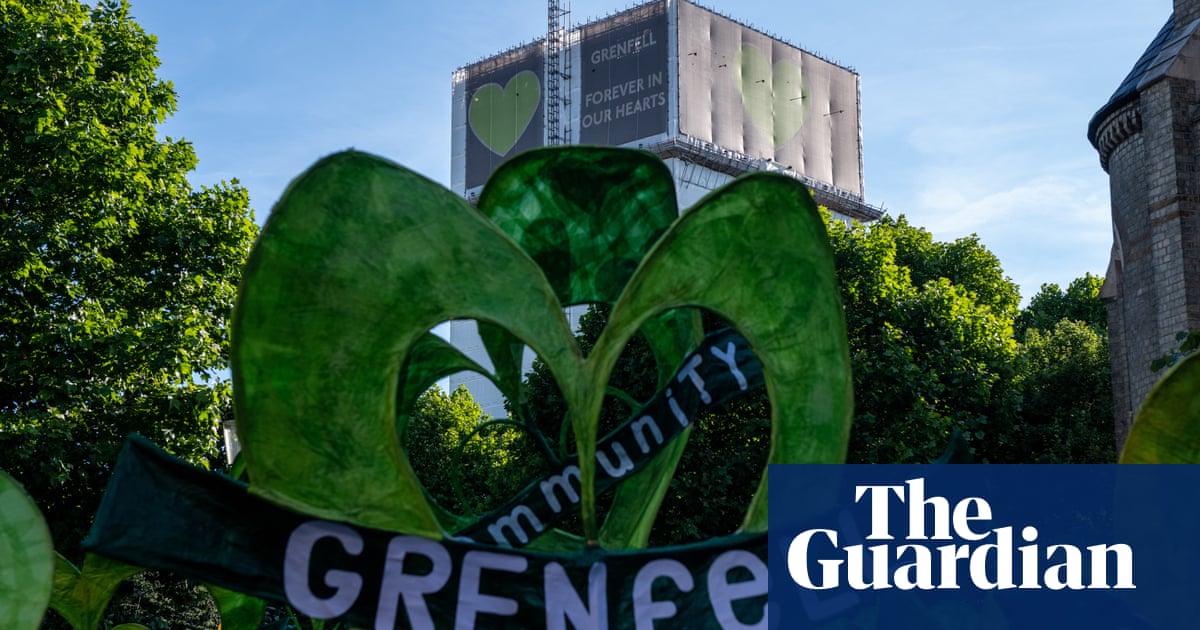
The multibillion dollar company that made Grenfell Tower’s combustible cladding will not attend an event at which survivors and bereaved people will testify about their suffering directly to companies that many hold responsible for the disaster.
Arconic made the plastic-filled panels that burned like petrol on 14 June 2017, when 72 people died. The firm has sparked anger among the Grenfell community by rejecting an invitation to what is expected to be a highly charged but potentially cathartic face-to-face event later this month, when about 36 people will “speak about the impact [the disaster] has had on them and those they care about”.
Speakers at the four-day Grenfell Testimony Week to be held in London from 23 to 26 January include Hanan Wahabi, who lost five members of her family, Behailu Kebede, in whose flat the fire started, and Anne-Marie Murphy, whose brother Denis died in the fire.
It was arranged as part of the settlement of a civil claim brought by hundreds of people caught up in the disaster in which they secured £150m in compensation from defendants, including Arconic. The package was mediated by Lord Neuberger, a former president of the supreme court.
Arconic told the Guardian: “We are not able to attend Testimony Week, and we have no comment beyond that.”
A lawyer for some of the bereaved survivors and residents affected by the fire described the decision as “despicable”, while Murphy said it was the “behaviour of heartless cowards”.
“I am appalled by it,” she said. “They let our loved ones down and they have let us down ever since.”
Celotex and Kingspan, which made combustible insulation, Rydon, the main contractor, the Royal Borough of Kensington and Chelsea, which owned the council block, and the Home Office and the Department for Levelling Up, Housing and Communities, which were responsible for fire services and building regulations, will all attend the event at the Church of England headquarters later this month.
Exova, the fire engineering company, said it “recognises the importance of Testimony Week and will be fully represented”.
The corporates were invited, but attendance is not mandatory, the Guardian understands.
“This goes to show that [Arconic] literally don’t care,” said Emma O’Connor, who escaped from her flat on the 20th floor and is scheduled to speak. “They ruined everyone’s lives, but they don’t care what people have to say.”
The face-to-face meetings are supposed to replace some of the lost sense of justice and catharsis when a case is settled out of court.
“Six and a half years after the fire, we have not been able to talk to the people whose actions and inactions have played a part in this [disaster] so it’s really important to be able to say something to them,” said Murphy.
The civil case was separate to the public inquiry and the Scotland Yard criminal investigations that could lead to manslaughter and fraud charges.
In 2021, Arconic caused anger when it cited arcane French law to prevent key executives responsible for manufacturing and sales of the polyethylene-filled cladding from being cross-examined at the public inquiry.
“We are not surprised that Arconic have continued to disrespect the families,” said Karim Mussilhy, who lost his uncle Hesham Rahman in the fire. “The corporations have learned nothing. It has been business as usual for them.”
In 2021 the inquiry heard that a decade before the fire, an executive from Arconic attended a seminar in Norway where a cladding expert raised the question of a manufacturer’s responsibility if a “building made out of polyethylene core” cladding were to catch fire, killing “60 to 70 persons”.
The Arconic executive was so concerned by the expert’s warning that he recommended the firm should consider only selling panels with a fire retardant core, but that did not happen.
Elizabeth Campbell, the Conservative leader of the local council, will attend, while the London fire brigade “will be sending senior officers to observe and listen to those affected”, a spokesperson said. Kingspan is “fully committed to supporting this important event”, a spokesperson said.
Survivors and their lawyers are meanwhile frustrated at delays to justice processes six and a half years after the blaze. The inquiry is not expected to publish its final report until June and is only now about to contact materials manufacturers and construction companies with details of the criticisms it plans to make. This process, under rule 13 of the inquiry, is “proving time consuming”, it said.
“Not only do we have to allow recipients a reasonable time to respond to potential criticisms, but we also have to analyse their responses in order to decide whether we need to modify our provisional conclusions or the way in which we have expressed them,” it said.
The police have said they will not finalise their recommendations to the Crown Prosecution Service for any charges until after the report has been published, which means that any trials may not start until 2025 or 2026.












